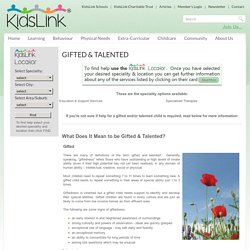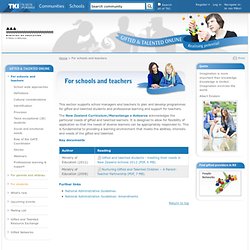

Are You A Visual Thinker? The Visual Learning Style. Gifted & Talented. If you're not sure if help for a gifted and/or talented child is required, read below for more information: Talented “Talented” children are those whose abilities have already been demonstrated by their achievements including in areas such as music, art, craft, dance or sport.

Their skills are within the top 10% of their age-peers. In simple terms, gifts are natural abilities whereas talents are developed skills. Being Gifted May Be Challenging There are several challenges facing gifted children. Another challenge facing the gifted child is self-esteem. Support, understanding and encouragement goes a long way in building confidence and lets gifted children know that they have a right to learn. Diagnosis Experts agree it is important to identify a gifted child to help them achieve their full potential. Whether your child is gifted and/or talented may be assessed by psychologists or other professionals with a special interest in or experienced in dealing with gifted children. Efeso Collins: Calling from the Margins. Untitled Document. NZ Assoc'n for Gifted Children. Home - Gifted and Talented. For schools and teachers / Home - Gifted and Talented.
This section supports school managers and teachers to plan and develop programmes for gifted and talented students and professional learning and support for teachers.

The New Zealand Curriculum/Marautanga o Aotearoa acknowledges the particular needs of gifted and talented learners. It is designed to allow for flexibility of application so that the needs of diverse learners can be appropriately responded to. This is fundamental to providing a learning environment that meets the abilities, interests and needs of the gifted and talented. Key documents Further links Return to top. Nurturing Gifted and Talented Children – A Parent Teacher Partnership. Gifted and talented students meeting their needs in New Zealand Schools. Support for gifted and talented children. A gifted or talented child can be found in any family and in almost any classroom.

Giftedness can be found in any culture, ethnic or socio-economic group. Their talents can be intellectual, emotional or physical, and appear at any age. A child with a disability can also be gifted. Giftedness refers to a high intelligence or aptitude, while talented refers to a high level of performance in areas such as music, art, craft, dance or sport. Giftedness is inherited but a gifted child needs support to identify and develop their special abilities. Most children need to repeat something 7-11 times to learn something new. Some signs of giftedness include exceptional (amazing) use of language, an ability to concentrate on complex tasks for a long time, asking lots of questions, or being exceptionally coordinated. Gifts or talents can be different within the context of ethnicity or culture. Experts agree it is important to identify a gifted child to help them achieve their full potential.
Small Poppies - Growing with a gift. Apex - the online journal of the NZAGC. REACH Education Consultancy +64 7 357 4232 working with educators of gifted children and gifted learners. Gifted Online, A Service of the New Zealand Centre for Gifted Education . GO Storymakers is an online club for gifted students, and other students who are passionate writers.

The work may be done during school time or after school, depending on needs and preferences. The cost is $50 per New Zealand school term. It is open to writers and other storymakers at primary (elementary) and secondary schools around the globe, but is run from New Zealand, and covered by New Zealand's laws. Who is a storymaker? Just in case you were wondering, a storymaker can be a writer who writes, or a writer who doesn't ... actually ... write. Each week there will be three suggestions for writers (and other storymakers) about topics, points of style or other writing considerations.